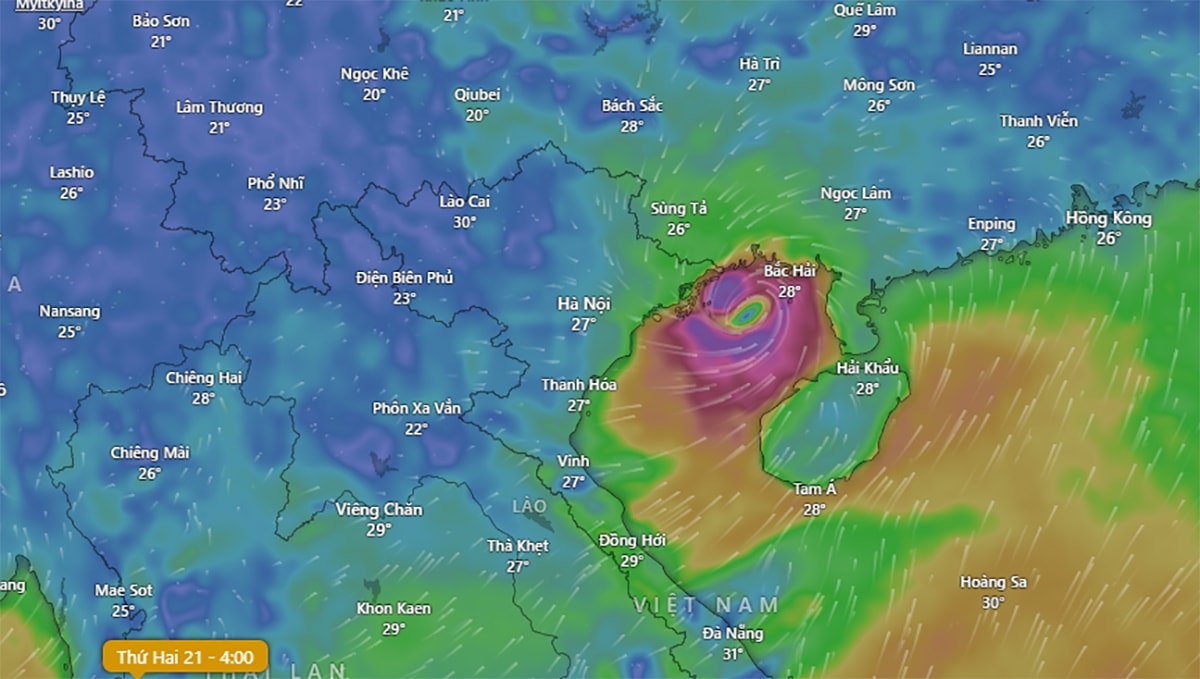Survival skills if you are unlucky enough to encounter an accident during storm number 3 Wipha
Typhoon No. 3 WIPHA is approaching with wind gusts of level 15, bringing with it the risk of heavy rain and flash floods. Here are 11 essential skills every family should master to protect life and property.
Storm No. 3 (Storm WIPHA) is assessed as a very strong storm, moving quickly with a very wide and dangerous range and intensity of influence on sea and land.
According to the forecast of the National Center for Hydro-Meteorological Forecasting, the storm will continue to strengthen with the strongest wind at sea reaching level 12, gusting to level 15.
From July 21-22, coastal areas from Quang Ninh to Thanh Hoa will be directly affected by the storm, causing strong winds and heavy rains in the Northern provinces and North Central provinces (Thanh Hoa, Nghe An, Ha Tinh).

Below are 11 essential skills every family needs to master to protect life and property.
1. Continuously update information from official sources
Knowing exactly when a storm will hit and how far it will affect you will help you prepare. Follow official channels like national television, reputable weather apps, and information from local authorities.
2. Ensure safety for boats and aquaculture areas
Coastal residents should move their boats to safe anchorages and absolutely not stay on boats, watchtowers or rafts when the storm approaches. Aquaculture areas should also be carefully reinforced.
3. Limit travel, especially to dangerous areas
During storms, it is advisable to cancel or postpone trips to mountainous areas, islands or areas prone to landslides. Going out during strong winds and heavy rains can be life-threatening.
4. Prepare a safe shelter for the whole family
Identify the strongest shelter in your home or a locally designated evacuation site. If your home is in a high-risk area, it is best to evacuate early rather than waiting for final notice.
5. Stock up on food, water and essential supplies
Before a hurricane hits, make sure your home has enough dry food, clean water, medicine, flashlights, spare batteries, and basic medical supplies to last for a few days if the power goes out or you are isolated by flooding.
6. Reinforce your home and clean up the surrounding area
Bracing roofs, closing windows, trimming trees, removing billboards and other items that are susceptible to wind are things that should be done before a storm. Construction sites should also be carefully protected.
7. Protect livestock and harvest early if possible
Barns need to be reinforced and livestock moved to safety. Farmers should harvest crops early to avoid damage after the storm.
8. Be alert for the risk of flooding and landslides
Low-lying areas and urban areas prone to flooding should be on guard against rising water, especially coastal areas and river mouths. In mountainous areas, pay attention to signs of landslides such as cracked soil and unusually fast-flowing water.
9. Keep your assets high and protect important documents
Move valuables and electronic devices to higher ground. Keep personal documents and important files in waterproof bags or in a dry, safe place. Motorbikes and cars should be moved to higher ground.
10. Clear sewers and proactively report incidents
Before heavy rains, clear drainage around your home. Don't park near sewers or apartment basements that are prone to flooding. If you notice a blockage or a risk of flooding, report it to your local authorities immediately.
11. Save emergency phone numbers
Save important phone numbers in your phone such as: police, medical, fire, local government. In case of emergency, timely contact can save the life of a loved one or yourself.
As storm No. 3 approaches with strong intensity, applying these skills will not only help protect lives but also minimize property damage for each family.
